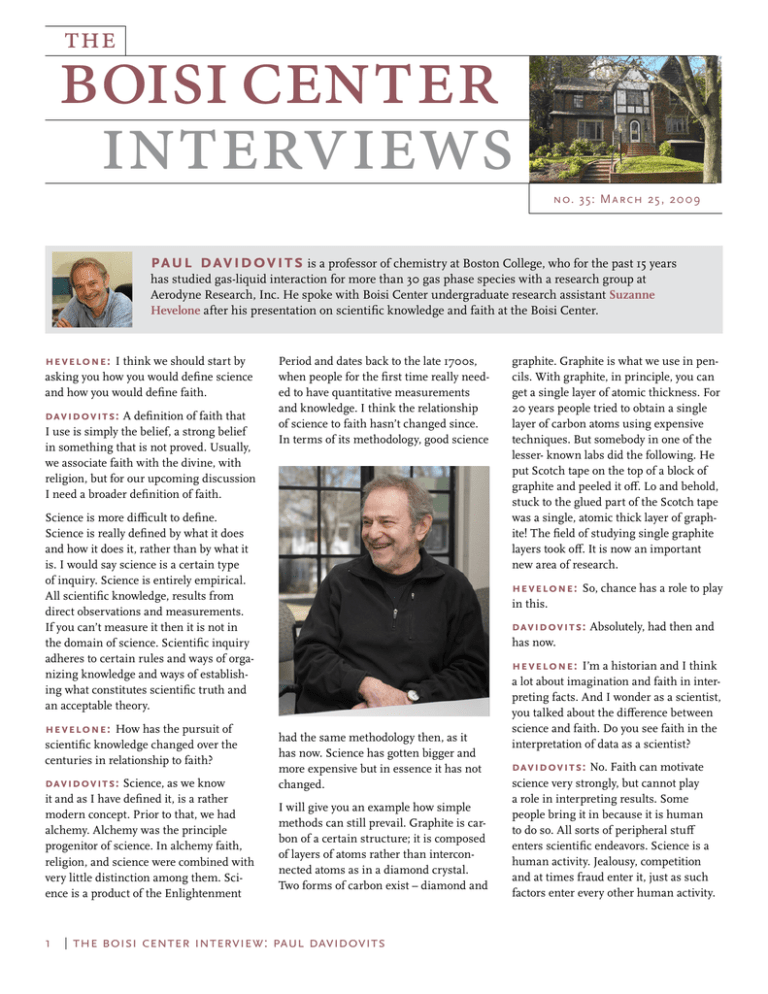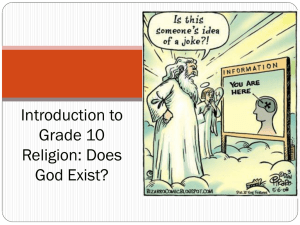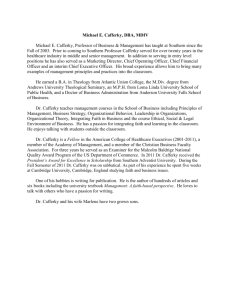Document 11102910
advertisement

the boisi center interviews no. 35: March 25 , 20 09 paul davidovits is a professor of chemistry at Boston College, who for the past 15 years has studied gas-liquid interaction for more than 30 gas phase species with a research group at Aerodyne Research, Inc. He spoke with Boisi Center undergraduate research assistant Suzanne Hevelone after his presentation on scientific knowledge and faith at the Boisi Center. hevelone: I think we should start by asking you how you would define science and how you would define faith. davidovits: A definition of faith that I use is simply the belief, a strong belief in something that is not proved. Usually, we associate faith with the divine, with religion, but for our upcoming discussion I need a broader definition of faith. Period and dates back to the late 1700s, when people for the first time really needed to have quantitative measurements and knowledge. I think the relationship of science to faith hasn’t changed since. In terms of its methodology, good science Science is more difficult to define. Science is really defined by what it does and how it does it, rather than by what it is. I would say science is a certain type of inquiry. Science is entirely empirical. All scientific knowledge, results from direct observations and measurements. If you can’t measure it then it is not in the domain of science. Scientific inquiry adheres to certain rules and ways of organizing knowledge and ways of establishing what constitutes scientific truth and an acceptable theory. hevelone: How has the pursuit of scientific knowledge changed over the centuries in relationship to faith? davidovits: Science, as we know it and as I have defined it, is a rather modern concept. Prior to that, we had alchemy. Alchemy was the principle progenitor of science. In alchemy faith, religion, and science were combined with very little distinction among them. Science is a product of the Enlightenment 1 graphite. Graphite is what we use in pencils. With graphite, in principle, you can get a single layer of atomic thickness. For 20 years people tried to obtain a single layer of carbon atoms using expensive techniques. But somebody in one of the lesser- known labs did the following. He put Scotch tape on the top of a block of graphite and peeled it off. Lo and behold, stuck to the glued part of the Scotch tape was a single, atomic thick layer of graphite! The field of studying single graphite layers took off. It is now an important new area of research. hevelone: So, chance has a role to play in this. davidovits: Absolutely, had then and has now. had the same methodology then, as it has now. Science has gotten bigger and more expensive but in essence it has not changed. I will give you an example how simple methods can still prevail. Graphite is carbon of a certain structure; it is composed of layers of atoms rather than interconnected atoms as in a diamond crystal. Two forms of carbon exist – diamond and the boisi center interview: paul davidovits hevelone: I’m a historian and I think a lot about imagination and faith in interpreting facts. And I wonder as a scientist, you talked about the difference between science and faith. Do you see faith in the interpretation of data as a scientist? davidovits: No. Faith can motivate science very strongly, but cannot play a role in interpreting results. Some people bring it in because it is human to do so. All sorts of peripheral stuff enters scientific endeavors. Science is a human activity. Jealousy, competition and at times fraud enter it, just as such factors enter every other human activity. However, science has very strict controls of reproducibility and peer evaluation that greatly inhibit questionable activity. If such controls were not in place, there might be just as much fraud in science as there is on Wall Street. hevelone: Are there any scientific disciplines that you see as being incompatible with faith? davidovits: Well, yes and no. It depends how we define faith. I have divided faith into three categories. One is faith that is incompatible, contradictory to science, such as faith in miracles. There is faith that is basically tangential to science. It is not in the domain of science; faith in human goodness, for example and then there is faith that motivates science. So, these are the three different types of faith that I have concocted. Perhaps you will tell me after the talk whether what I have concocted makes sense. hevelone: Concocted or revealed? davidovits: Revealed? That’s faith! hevelone: I heard you talk about Einstein in an earlier presentation and the importance of his faith and relationship to science. davidovits: That is this kind of faith that drives science. hevelone: I wondered if you could talk a little bit about him and some other great scientists where faith has driven their science. sentation was generated by the title. I am glad I chose this title. The questions you are asking are exactly the questions that I tried to respond to when I composed the presentation. hevelone: I was wondering if you The people who came together at Boston College brought the institution very rapidly up from a regional college, to a level of a serious university, which we are today. I will give you one example of what Boston College offered to people like me and to everybody who came here. “I have divided faith into three categories. One is faith that is contradictory to science, there is faith that is basically tangential to science, and then there is faith that motivates science.” I came here in 1974, when the institution had very few resources. I was preparing a proposal. In those days, you had to submit 20 copies to the funding agency. I needed 20 glossy photographs of my apparatus to include in the proposal. At a faculty meeting I asked how I could contact the audio/visual department so that I could get somebody to come and make these photographs. That is how I would have done it at my previous institution. I was told that Boston College didn’t have an audio/visual department. And I needed to get this proposal out in a week. What followed formed my lasting impression of Boston College davidovits: It depends what you mean of the talk. I will speak of Einstein and also of several other people. You are asking exactly the questions I asked myself. I wish I had talked to you beforehand because I had a really tough time—tough is not the right word—fun time trying to disentangle this whole issue of science and faith. by faith and science exactly. These are the right questions. I’m concerned that if I expand on this issue now, you will not be interested in my talk. 2 been at Boston College, the institution flourished. Boston College brought together people from a wide range of backgrounds and provided a highly accepting and caring environment. think that having faith, and it doesn’t necessarily have to be religious faith, but having some sort of faith makes you a better scientist, or can you be a good scientist and not be a person that has faith? davidovits: This subject will be part When I was first asked what I wanted to talk about, I chose this topic. I had no idea what the presentation would be, what I would talk about, and so the pre- davidovits: During the time I have hevelone: I will be very interested in your talk! I have just one final question and that is in what way or ways do you see Catholic universities as better positioned than their secular counterparts to address issues of religion and faith? Or perhaps they’re not? the boisi center interview: paul davidovits Father Schubert, a Jesuit colleague, said, Paul, why don’t you show me what you need. I said okay and I did. I came back the following morning and there was a package on my doorstep, in it were 20 glossy photographs of my apparatus, beautifully done. Schubert, an amateur photographer, must have worked all night to prepare the photographs. That’s the kind of thing people did for each other and this set a certain mood, certain type of a behavior. Boston College was a very welcoming and inclusive place, and perhaps inevitably, as we grow, and as times change, we are loosing these attributes. But to return to your question; I don’t know about other Catholic universities, but Boston College is still a unique place. The many types of forums, such as today’s lunch seminar, bring together a wide variety of people to think about and address issues of fundamental and deep importance. I think such activities are rare at other institutions. hevelone: Just to end on the issue of collegiality, how do you see working with scientists of other stripes? You’re a chemist, right? davidovits: Yes, I am a chemist. Traditionally scientists in different disciplines have stayed separated. They have separate associations, separate conferences, separate journals, separate funding agencies and so on. They don’t have much to do with each other. But things are changing. For example, physical chemistry, which I do, could be in the departments of geology or physics. There has been an attempt to remove the barriers between sciences, but it is no more successful than removing barriers, say, in philosophy. The continental philosophers and the analytical philosophers don’t say much to each other, and I am sure the same is true for historians. But the science funding agencies are pushing toward interdisciplinary interactions. They realize that in order to be effective, chemists need the tools of physics and physicists need the tools of chemistry and so on. We see more and more interdisciplinary activities all across the sciences. [end] The Boisi Center for Religion and American Public Life Boston College 2 4 Quinc y Road Chestnut Hill, MA 02 467 tel 617 - 55 2-1860 f a x 617 - 55 2-1863 publife@b c .e du Visit bc .e du/boisi-resources for a complete set of the Boisi Center Inter views and audio, video, photographs, and transcripts from our events. 3 the boisi center interview: paul davidovits b oisicenter @b oisi _ center







